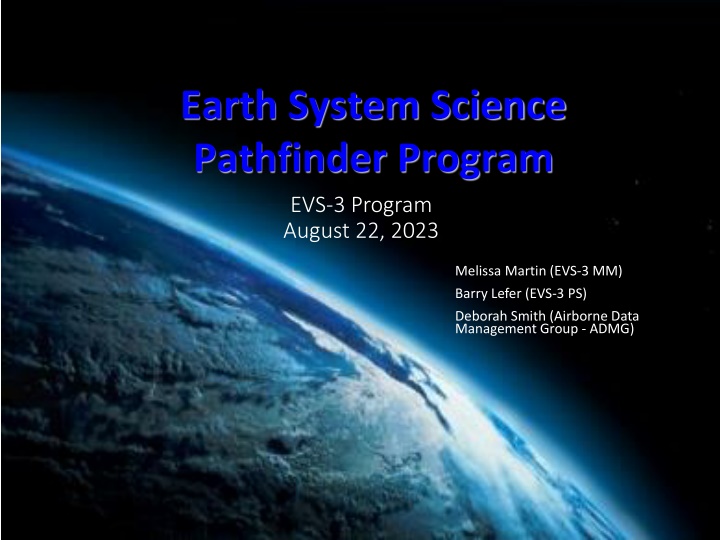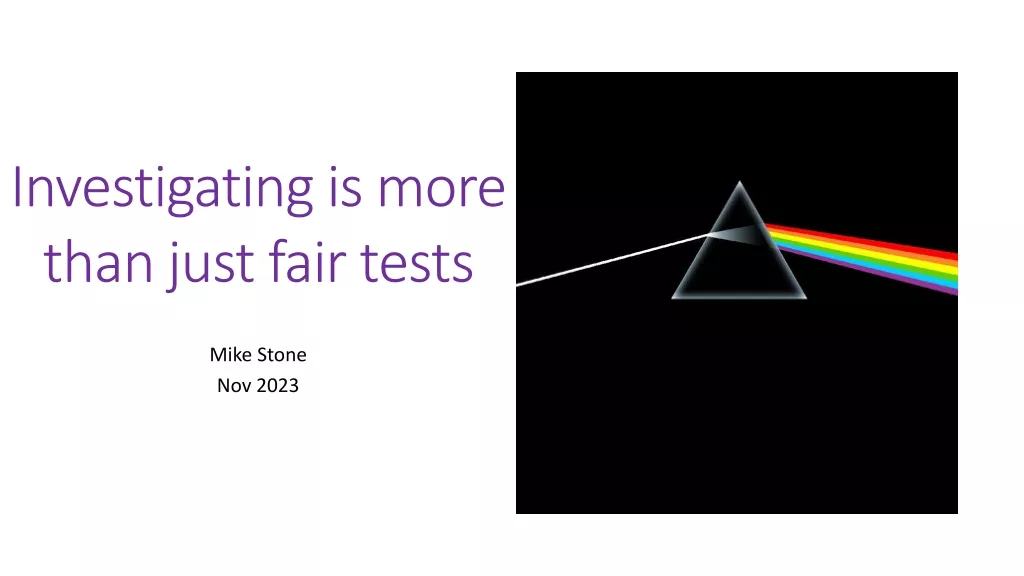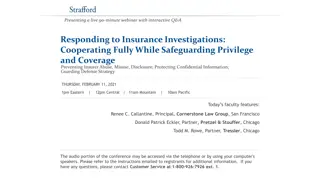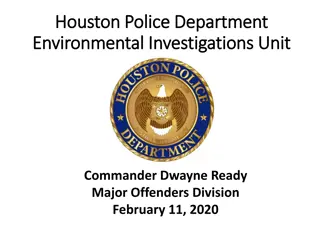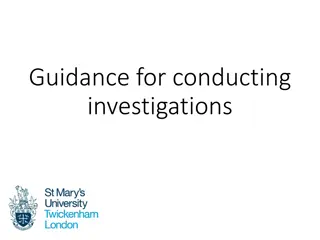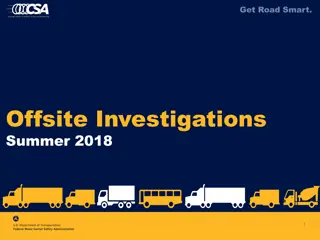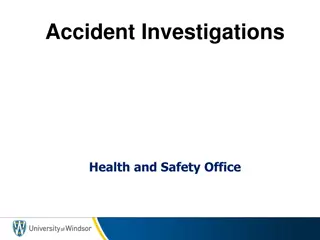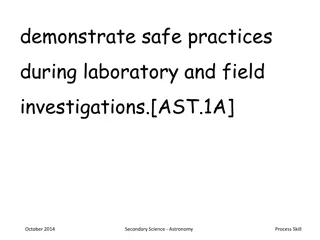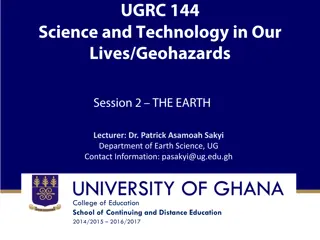Best Practices for Earth System Science Investigations
Explore the key aspects of conducting successful Earth System Science investigations, covering topics such as teamwork, inclusivity, planning, documentation, communication, and budget considerations. Learn about the importance of open communication, clear deployment plans, contingency strategies, and defining roles and responsibilities to ensure smooth operations. Discover insights on optimizing post-flight data analysis, maintaining collaboration, and managing budgets effectively in scientific missions.
Download Presentation

Please find below an Image/Link to download the presentation.
The content on the website is provided AS IS for your information and personal use only. It may not be sold, licensed, or shared on other websites without obtaining consent from the author.If you encounter any issues during the download, it is possible that the publisher has removed the file from their server.
You are allowed to download the files provided on this website for personal or commercial use, subject to the condition that they are used lawfully. All files are the property of their respective owners.
The content on the website is provided AS IS for your information and personal use only. It may not be sold, licensed, or shared on other websites without obtaining consent from the author.
E N D
Presentation Transcript
Earth System Science Pathfinder Program EVS-3 Program August 22, 2023 Melissa Martin (EVS-3 MM) Barry Lefer (EVS-3 PS) Deborah Smith (Airborne Data Management Group - ADMG)
Topics for Discussion Lessons learned Open data workshops Inclusivity, inclusion, and diversity Optimized post-flight data analysis and dissemination Strategies used for using final dollars such as those in reserves How to keep the Investigation science going after completion of EVS Investigation Types of overview papers that have been done Opportunities for collaboration across the EVS Investigations? Mission synergies to be taken advantage of? Final data archive, synchronized data, data release date
Inclusivity Investigation Code of Conducts / Agreements of behavior Required Investigation documentation To be developed as a team for overall buy-in Accessibility: Shared drive accessible to all participants (NASA and non-NASA) Communications within the science team Frequency of meetings, openness, communication platform used, etc. Inner-project deployment communication (lines of authority) Recommend 1:1 point of contact between science and aircraft ops for decisions, flight schedules, engineering, modifications, requirements, etc. to ensure both orgs know where decisions are coming from and how to disseminate to respective orgs. Open communication: When a request or activity cannot be executed/approved, it is helpful for the teams to understand the rationale
Planning SOFRS (Science Operations Flight Request System): to be kept up to date and to include all pertinent information including all PIs and funding Program Managers Deployment site visits/survey: critical to the success of the campaign and needs to be done in advance. should include alternative locations (diverts, moving operations, etc.) Schedules and operational windows: Should be clearly defined during the planning phase Contingency plans should be established which incorporate flexibility in the schedule Important to recognize risks to schedules and deployment locations, such as aircraft availability, ship availability, personnel availability, weather, etc. Need back-up flight scientists and operators for instruments Budgetary considerations: Any changes (even minor changes) from budgeted aircraft ops plan can result in increases higher than expected. Need as many details as possible laid out in advance to understand costs (e.g. pace of operations, weekend flights, suitcase flts, double sorties). Personnel: Roles and responsibilities should be clearly defined Commitments from Investigation science teams need to be established before the start of the campaign to prevent interruptions in the field support Emergency management, guidelines, reporting and procedures should be developed and clearly understood (at least by the Investigation management team) Flight planning: It is beneficial to have a pilot on the ground to help with flight planning (while a flight is going on) especially if the flight being planned is complicated. This might be at an additional cost.
Data Management Requirements at ICR: Data quality analysis is needed at the individual PI level and project level to provide a wholistic picture and ensure project data quality. At least two data submission deadlines may be needed, one for individual co-Is and the second one for an independent assessment of all data to check for consistency especially between the closely related measurements. Sampling time synchronization requirements At project start, Project Scientist should meet with each instrument co-I individually to: 1. Reaffirm measurements or products that are required for the archive and separate any additional value added products (beyond level 1 science requirements) that will not tracked by the Investigation or Program office. 2. Determine if there are any dependencies on other datasets and how each team would deal with delays from those dependencies. 3. Determine how data is going to be time stamped relative to other measurements and get agreements that the team will address any issues determined from the data archive. 4. Get commitment to meet archive schedule from each instrument Co-I. 5. After meeting instrument Co-Is individually, meet as a group to discuss overall schedule. 6. Issues with meeting schedule should be resolved before data collection begins (include ESSP/HQ) 7. Establish process with ESSP/HQ for re-evaluating data deadlines in case of unexpected contingencies, schedule changes, or new commitments. Prior to each deployment: 1. Meet with each instrument co-I to review required data products and schedule. Discuss any new commitments/projects that may impact ability to meet schedule. 2. Discuss issues with ESSP/HQ to resolve 3. Decide on policy for status checks Post deployment 1. 2. 3. Perform status checks and plan for evaluating the datasets for consistency (e.g. time sync, reporting intervals). Identify issues with meeting deadlines at earliest possible time Engage ESSP/HQ if needed to adjust timeline and relate potential long-term impacts For late data: 1. Archive any data without dependencies on schedule but Project Scientist should get agreements to that an update will be provided once dependencies are available. Make archive schedule and status check schedule 2. Once archive is complete, perform integrated analysis to cross check data agreement/alignment
Open Data Workshop What is NASA looking for here? Lessons learned from Open Data Workshops ESSP PO applications funded: Delta-X applications workshop Improve airborne and field data stewardship
